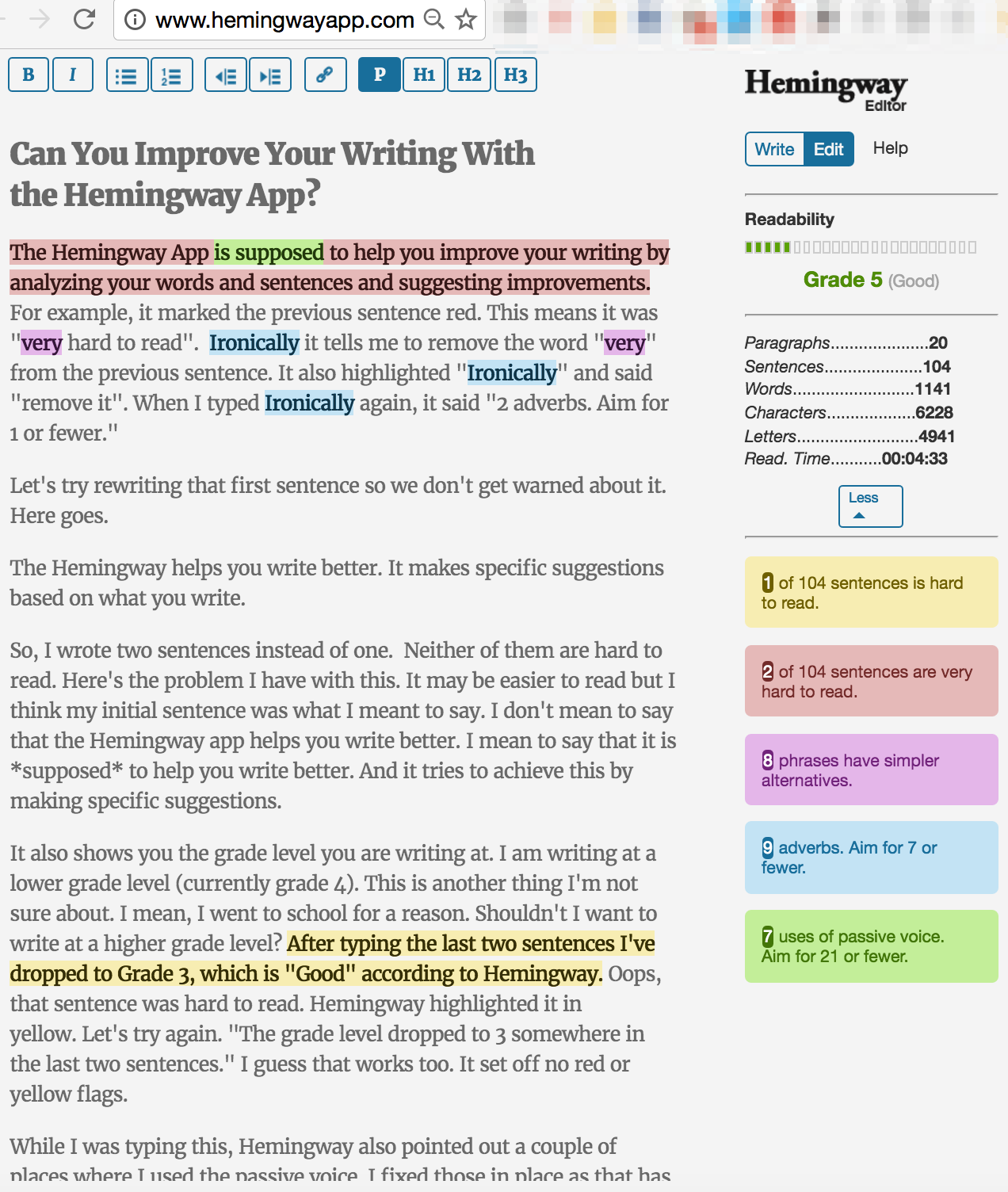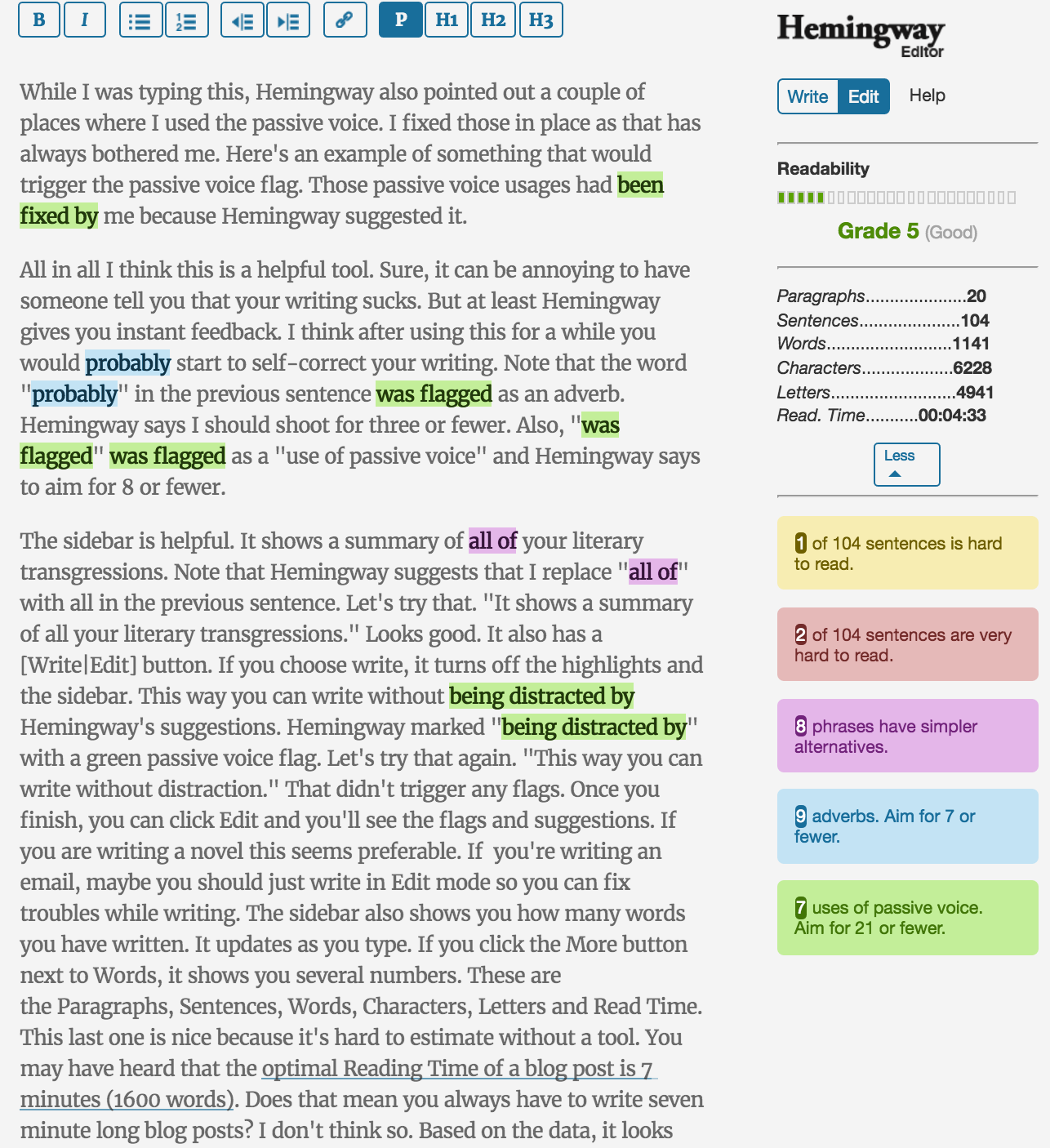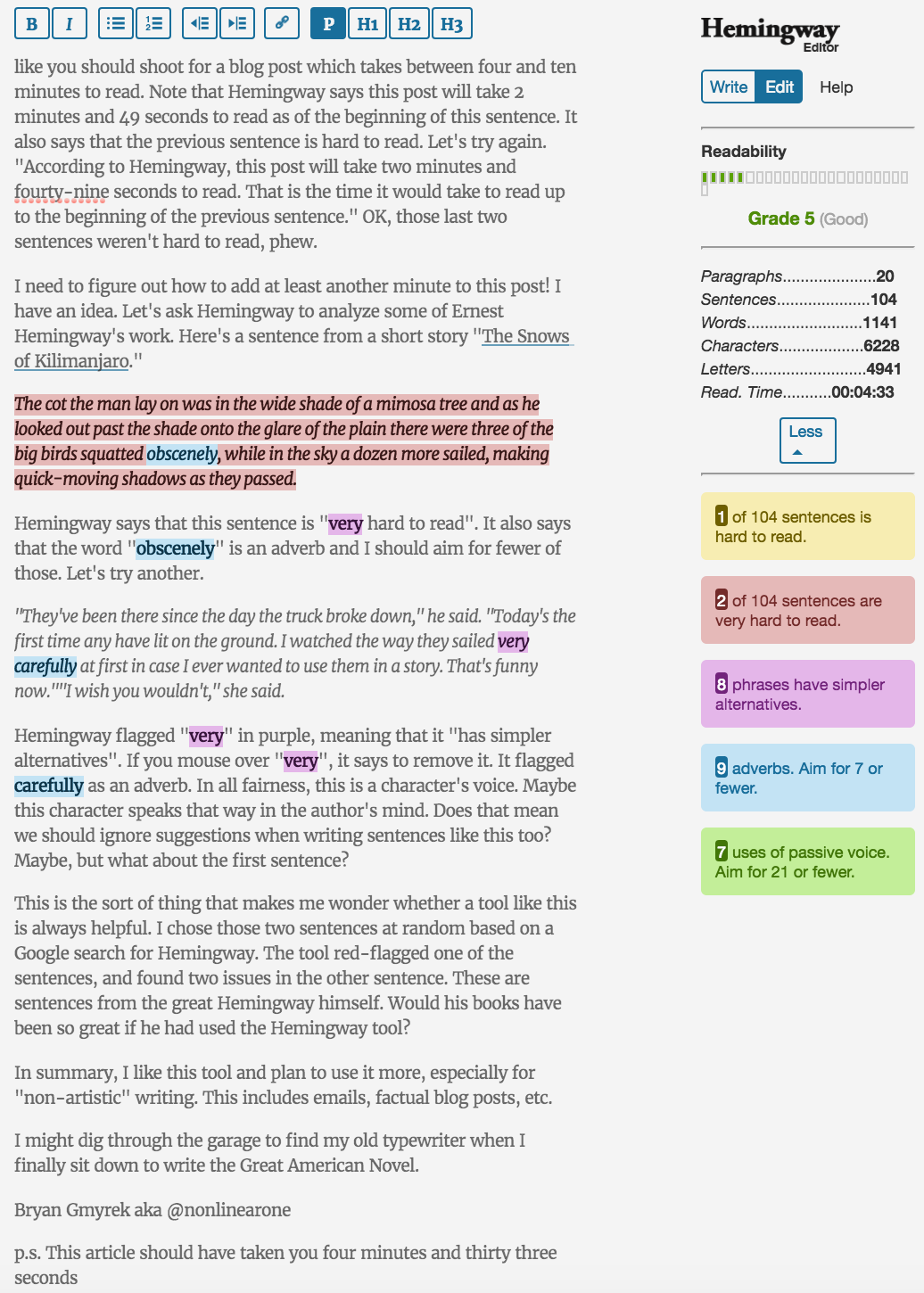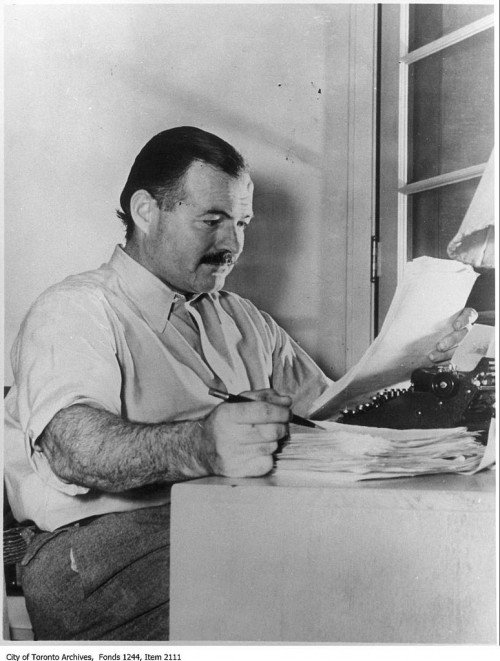
Check out these screen shots of what editing this post on the Hemingway App (HemingwayApp.com) looks like. I've included the text below.



The Hemingway App is supposed to help you improve your writing by analyzing your words and sentences and suggesting improvements. For example, it marked the previous sentence red. This means it was "very hard to read". Ironically it tells me to remove the word "very" from the previous sentence. It also highlighted "Ironically" and said "remove it". When I typed Ironically again, it said "2 adverbs. Aim for 1 or fewer."
Let's try rewriting that first sentence so we don't get warned about it. Here goes.
The Hemingway App helps you write better. It makes specific suggestions based on what you write.
So, I wrote two sentences instead of one. Neither of them are hard to read. Here's the problem I have with this. It may be easier to read but I think my initial sentence was what I meant to say. I don't mean to say that the Hemingway app helps you write better. I mean to say that it is supposed to help you write better. And it tries to achieve this by making specific suggestions.
It also shows you the grade level you are writing at. I am writing at a lower grade level (currently grade 4). This is another thing I'm not sure about. I mean, I went to school for a reason. Shouldn't I want to write at a higher grade level? After typing the last two sentences I've dropped to Grade 3, which is "Good" according to Hemingway. Oops, that sentence was hard to read. Hemingway highlighted it in yellow. Let's try again. "The grade level dropped to 3 somewhere in the last two sentences." I guess that works too. It set off no red or yellow flags.
While I was typing this, Hemingway also pointed out a couple of places where I used the passive voice. I fixed those in place as that has always bothered me. Here's an example of something that would trigger the passive voice flag. Those passive voice usages had been fixed by me because Hemingway suggested it.

[image credit - CC licensed]
All in all I think this is a helpful tool. Sure, it can be annoying to have someone tell you that your writing sucks. But at least Hemingway gives you instant feedback. I think after using this for a while you would probably start to self-correct your writing. Note that the word "probably" in the previous sentence was flagged as an adverb. Hemingway says I should shoot for three or fewer. Also, "was flagged" was flagged as a "use of passive voice" and Hemingway says to aim for 8 or fewer.
The sidebar is helpful. It shows a summary of all of your literary transgressions. Note that Hemingway suggests that I replace "all of" with all in the previous sentence. Let's try that. "It shows a summary of all your literary transgressions." Looks good. It also has a [Write|Edit] button. If you choose write, it turns off the highlights and the sidebar. This way you can write without being distracted by Hemingway's suggestions. Hemingway marked "being distracted by" with a green passive voice flag. Let's try that again. "This way you can write without distraction." That didn't trigger any flags. Once you finish, you can click Edit and you'll see the flags and suggestions. If you are writing a novel this seems preferable. If you're writing an email, maybe you should just write in Edit mode so you can fix troubles while writing. The sidebar also shows you how many words you have written. It updates as you type. If you click the More button next to Words, it shows you several numbers. These are the Paragraphs, Sentences, Words, Characters, Letters and Read Time. This last one is nice because it's hard to estimate without a tool. You may have heard that the optimal Reading Time of a blog post is 7 minutes (1600 words). Does that mean you always have to write seven minute long blog posts? I don't think so. Based on the data, it looks like you should shoot for a blog post which takes between four and ten minutes to read. Note that Hemingway says this post will take 2 minutes and 49 seconds to read as of the beginning of this sentence. It also says that the previous sentence is hard to read. Let's try again. "According to Hemingway, this post will take two minutes and forty-nine seconds to read. That is the time it would take to read up to the beginning of the previous sentence." OK, those last two sentences weren't hard to read, phew.

[image credit - CC licensed]
I need to figure out how to add at least another minute to this post! I have an idea. Let's ask Hemingway to analyze some of Ernest Hemingway's work. Here's a sentence from a short story "The Snows of Kilimanjaro."
The cot the man lay on was in the wide shade of a mimosa tree and as he looked out past the shade onto the glare of the plain there were three of the big birds squatted obscenely, while in the sky a dozen more sailed, making quick-moving shadows as they passed.
Hemingway says that this sentence is "very hard to read". It also says that the word "obscenely" is an adverb and I should aim for fewer of those. Let's try another.
"They've been there since the day the truck broke down," he said. "Today's the first time any have lit on the ground. I watched the way they sailed very carefully at first in case I ever wanted to use them in a story. That's funny now.""I wish you wouldn't," she said.
Hemingway flagged "very" in purple, meaning that it "has simpler alternatives". If you mouse over "very", it says to remove it. It flagged carefully as an adverb. In all fairness, this is a character's voice. Maybe this character speaks that way in the author's mind. Does that mean we should ignore suggestions when writing sentences like this too? Maybe, but what about the first sentence?
This is the sort of thing that makes me wonder whether a tool like this is always helpful. I chose those two sentences at random based on a Google search for Hemingway. The tool red-flagged one of the sentences, and found two issues in the other sentence. These are sentences from the great Hemingway himself. Would his books have been so great if he had used the Hemingway tool?
In summary, I like this tool and plan to use it more, especially for "non-artistic" writing. This includes emails, factual blog posts, etc.
I might dig through the garage to find my old typewriter when I finally sit down to write the Great American Novel.
Bryan Gmyrek aka @nonlinearone
p.s. This article should have taken you four minutes and thirty three seconds to read.
New :) Email "decentralized" to bryangmyrekcom@gmail.com to join my new newsletter about decentralized technologies, nature, and more.

Bryan Gmyrek [verification post] lives in sunny Arizona with his wife, three sons, and two golden puppies. He earned a Ph.D. in physics for his work at Fermilab and also enjoys computers, nature photography and blockchains.
